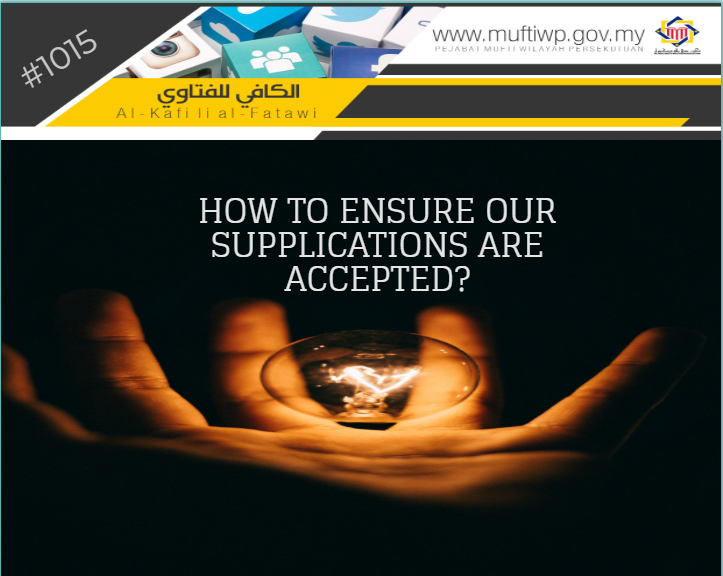Question:
Assalamualaikum SS Dato’ Seri Mufti. What should we do to ensure that our supplications are accepted by Allah SWT?
Answer:
Alhamdulillah, praise and thanks to Allah for the many countless blessings He has blessed us all with. Blessings and salutations to the Prophet Muhammad PBUH, his wives, his family, companions and all those that follow his teachings to the day of judgement.
We have answered this question several times before. Among the important things that need to be considered when supplicating is the manners of supplication. Here, we present some of the manners of supplication: [1]
First: Supplicating with sincere hope and certainty
Among the manners of supplication is, he has to ask with good thought towards Allah SWT that his supplication will be accepted and granted. Furthermore, he should also supplicate with sincere hope (that his supplication will be accepted) and fear (that his supplication is going to be rejected). This is in accordance with the statement of Allah SWT:
إِنَّهُمْ كَانُوا يُسَارِعُونَ فِي الْخَيْرَاتِ وَيَدْعُونَنَا رَغَبًا وَرَهَبًا
“Indeed, they used to hasten to good deeds and supplicate Us in hope and fear,”
Surah al-Anbiya’ (90)
The preceding verse tells a story of how several prophets supplicate to Allah SWT. The Prophet Job (Ayyub) AS asked Allah SWT to cure him of his illness and Allah SWT granted his request. Prophet Jonah (Yunus) prayed that he would be saved from the belly of the whale, then Allah granted his wish. Next, is the Prophet John (Yahya) who supplicate to have a child and Allah SWT blessed him with a child. All these prophets’ supplications are accepted for they all supplicate with hope and fear towards Allah SWT.
The same is stated in a hadith from Abu Hurairah RA, the Prophet PBUH said:
ادْعُوا اللَّهَ وَأَنْتُمْ مُوقِنُونَ بِالإِجَابَةِ وَاعْلَمُوا أَنَّ اللَّهَ لاَ يَسْتَجِيبُ دُعَاءً مِنْ قَلْبٍ غَافِلٍ لاَهٍ
“Call upon Allah while being certain of being answered, and know that Allah does not respond to a supplication from the heart of one heedless and occupied by play.”
Sunan al-Tirmizi (3479)
Second: Praising Allah SWT Before Supplication
Among the manners of supplication is to praise Allah SWT before asking or requesting anything. An easy example for this can be seen in the order of surah al-Fatihah. This is narrated in a long hadith from Abu Hurairah RA, he said, the Prophet PBUH explains the recitation of al-Fatihah in prayer. Then, Allah SWT divides it into two parts, for Him and another for His slaves.
It is clear in surah al-Fatihah, there are 5 praises of Allah from the first until the fifth verse of the surah. Then in the sixth verse, it is followed by the first supplication, which is:
اهْدِنَا الصِّرَاطَ الْمُسْتَقِيمَ
“Guide us to the straight path,”
Surah al-Fatihah (6)
The same is stated by Allah SWT in the Quran where the supplication of the Prophet Abraham (Ibrahim) AS in mentioned, where he starts his supplication with:
الَّذِي خَلَقَنِي فَهُوَ يَهْدِينِ (78) وَالَّذِي هُوَ يُطْعِمُنِي وَيَسْقِينِ (79) وَإِذَا مَرِضْتُ فَهُوَ يَشْفِينِ (80) وَالَّذِي يُمِيتُنِي ثُمَّ يُحْيِينِ (81) وَالَّذِي أَطْمَعُ أَن يَغْفِرَ لِي خَطِيئَتِي يَوْمَ الدِّينِ
“Who created me, and He [it is who] guides me. And it is He who feeds me and gives me drink. And when I am ill, it is He who cures me. And who will cause me to die and then bring me to life? And who I aspire that He will forgive me my sin on the Day of Recompense."
Surah al-Syu’ara (78-82)
Analysing the above verses, they are all praises of a slave for his God. Subsequently, Prophet Abraham AS continued his supplication with five requests to Allah SWT and it is recorded through His statements:
رَبِّ هَبْ لِي حُكْمًا وَأَلْحِقْنِي بِالصَّالِحِينَ (83) وَاجْعَل لِّي لِسَانَ صِدْقٍ فِي الْآخِرِينَ (84) وَاجْعَلْنِي مِن وَرَثَةِ جَنَّةِ النَّعِيمِ (85) وَاغْفِرْ لِأَبِي إِنَّهُ كَانَ مِنَ الضَّالِّينَ (86) وَلَا تُخْزِنِي يَوْمَ يُبْعَثُونَ
[And he said], "My Lord, grant me authority and join me with the righteous. And grant me a reputation of honor among later generations. And place me among the inheritors of the Garden of Pleasure. And forgive my father. Indeed, he has been of those astray. And do not disgrace me on the Day they are [all] resurrected.”
Surah al-Syu’ara (83-87)
Hence, through this divine revelation, there is guidance of how supplication should start, which is with praises to Allah SWT.
As an addition, we will state two hadiths of the Prophet PBUH to complete our answer.
- From Abu Hurairah RA, the Prophet PBUH said:
مَنْ سَرَّهُ أَنْ يَسْتَجِيبَ اللَّهُ لَهُ عِنْدَ الشَّدَائِدِ وَالْكُرَبِ، فَلْيُكْثِرِ الدُّعَاءَ فِي الرَّخَاءِ
“Whoever wishes that Allah would respond to him during hardship and grief, then let him supplicate plentifully when at ease.”
Sunan al-Tirmizi (3382) and Abu Ya’la in his Musnad (6396)
- From Abu Hurairah RA, the Prophet PBUH said:
دْعُوا اللَّهَ وَأَنْتُمْ مُوقِنُونَ بِالإِجَابَةِ ، وَاعْلَمُوا أَنَّ اللَّهَ لاَ يَسْتَجِيبُ دُعَاءً مِنْ قَلْب غَافِلٍ لاَهٍ
“Call upon Allah while being certain of being answered, and know that Allah does not respond to a supplication from the heart of one heedless and occupied by play.”
Sunan al-Tirmizi (3479), al-Hakim (1817) and Ibn Hibban (1/372)
May Allah SWT make us among those who always supplicate to Allah SWT whether we are happy or in need. Amin.
End Notes:
[1] See our previously published article in Irsyad al-Fatwa series 214: The Ruling of Sending Supplication to the Holy Land. http://muftiwp.gov.my/ms/artikel/irsyad-fatwa/irsyad-fatwa-umum/2281-irsyad-al-fatwa-siri-ke-214-hukum-mengirim-doa-dari-tanah-suci


